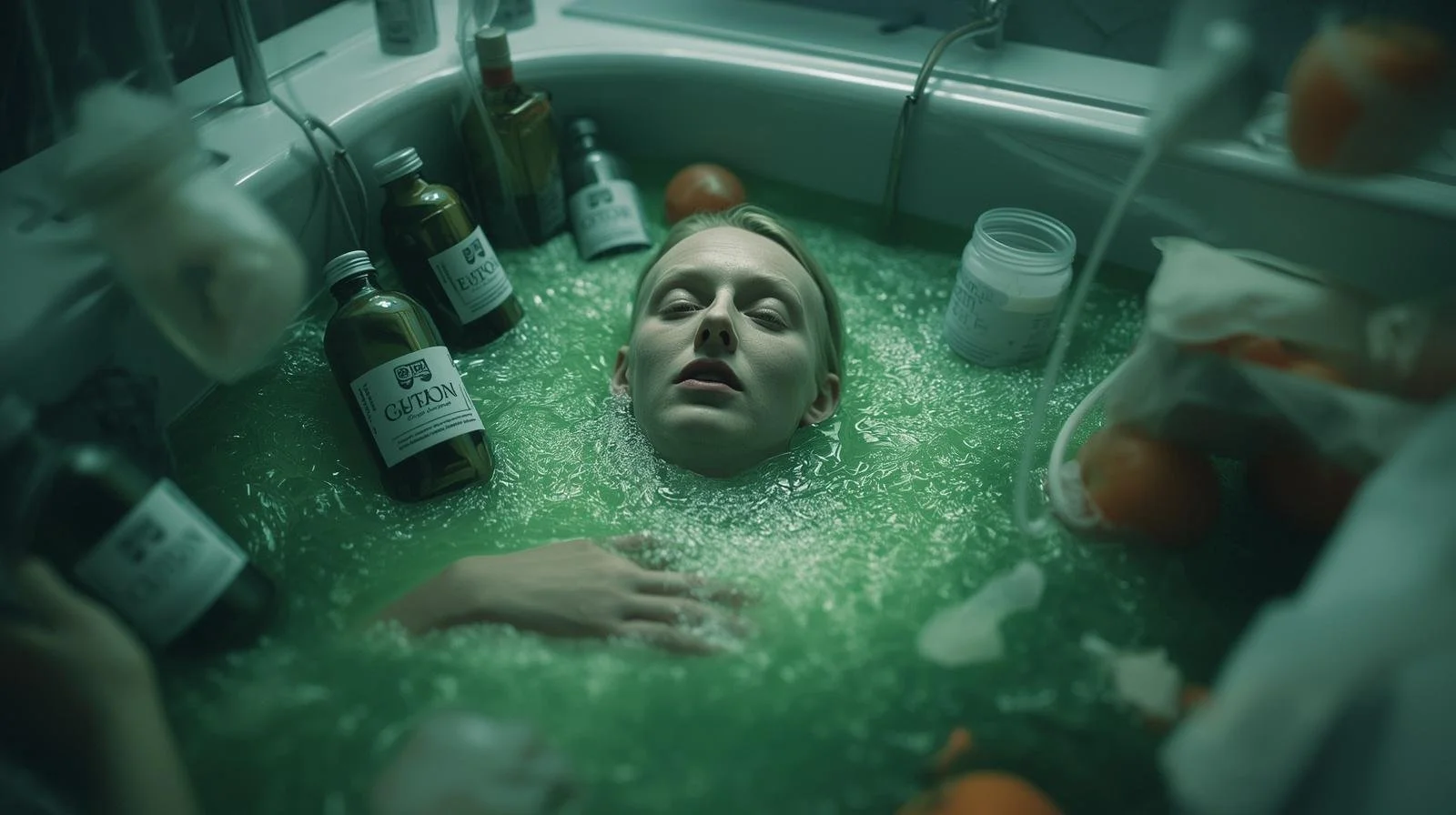Hope for Sale: The Pseudoscience Killing Cancer Patients
Cancer patients are being told to juice, detox, manifest, and vibrate their tumors away. Behind these miracle claims is a booming wellness industry—and those who believe it often lose more than money. They lose time. And sometimes, they lose their lives.
They Sold her Hope. She died.
In 2003, Penelope Dingle was diagnosed with rectal cancer. She refused chemotherapy, radiation, and surgery. Instead, she turned to a homeopathic regimen of vitamin C injections and homemade enemas. Her alternative healer convinced her that this was the “natural” path to healing. She died in 2005.
Penelope is just one of countless people who put their trust in turmeric over treatment, frequencies over fact. And in today’s world—where every scroll brings another “miracle cure”—the danger has only multiplied. Wellness gurus, natural healers, and metaphysical energy coaches are everywhere. Especially on social media, where hope is sold in pretty packaging—and billed in dollars.
Celebrity Case Studies Are Not Cures
Elle Macpherson became the poster child for spiritual cancer healing after she credited her remission to emotional detox and energy work. Her healer, Simone Laubscher—who claims a PhD in “cancer healing”—guided her through a protocol of trauma clearing and natural remedies.
What didn’t make the headlines from this story? The fact that Macpherson had early-stage breast cancer. She underwent chemotherapy and surgery before switching to alternative practices. Her “healing journey” was less miracle, more medicine. Australian oncologists publicly pushed back when patients began quoting Elle as a reason to decline conventional care. But the damage had begun. Because when a celebrity says she beat cancer with meditation and herbal tea, many want to believe they can too.
The Diet That Didn’t Cure Me
Among the many so-called “natural cancer cures,” special diets often rank high on the list. I’ll keep this personal.
In the fall of 2024, former Indian cricketer Navjot Singh Sidhu held a video conference where he credited his wife’s Stage IV metastasized breast cancer remission to a specific diet: turmeric root, neem leaves, and intermittent fasting. He claimed the diet cured her in just 40 days. No mention of chemotherapy or surgery.
His message spread rapidly—and so did the advice that I began receiving. Soon, I was encouraged to incorporate turmeric into every meal: boiled turmeric, turmeric ladoos, turmeric soup. I was also told to eliminate dairy—especially chhena, a food I love—because it was labeled dairy & “inflammatory”. None of the special diet advice he had shared with the world worked for me. My cancer markers continued to rise. My tumors kept growing. Due to a rare mutation, even multiple lines of chemotherapy failed. The dietary changes made no measurable impact, except that I began to feel disconnected from food and meal times.
A few days after Sidhu’s video went viral, oncologists across India issued statements refuting his claims. They clarified that his wife had also undergone chemotherapy and surgery—standard treatments that were conveniently left out of the narrative.
Nutrition matters. A well-balanced diet can support the body, aid in recovery, and enhance overall quality of life. But to suggest it can magically CURE cancer in 40 days is not just misleading—it’s dangerous.
Positive Thinking OR Vibrating at the Frequency of the Higgs Boson to Cure Cancer
Why do some people survive cancer while others don’t? It often comes down to biology: the type of cancer, the stage at diagnosis, and how common the DNA mutation is. A common mutation? Researchers have likely tested drugs for it. A rare one? You’re in uncharted territory.
I’ve asked my oncologists: “Is there anything I can do to improve my outcome?” Their answer is always the same—“That’s our job.” I show up. I eat well. I stay mentally resilient. But no one in a white coat has ever told me that “thinking positively” would cure my cancer.
Yet outside the hospital, there’s a different kind of prescription being handed out: VIBES. “Raise your frequency!” they say. “Manifest healing!” “Your mindset is blocking your recovery.” Translation? If you’re still sick, it’s your fault. The enlightened gurus are eager to sell their programs, workshops, and healing protocols. They call it empowerment - I call it profit.
Recognizing Key Red Flags in Claims and Advertising
A cancer diagnosis often plunges individuals and their families into an emotionally fragile state, marked by a profound desire to explore every conceivable avenue to combat the disease. This intense emotional landscape, coupled with the overwhelming nature of the diagnosis, creates a significant susceptibility to unsubstantiated claims. Those selling various miraculous cures have developed key techniques for manipulating their mechanism.
A cornerstone of these deceptive schemes is their heavy reliance on individual testimony and the miraculous results that are claimed. When dealing with chronic or terminal illness, a person will relate to others in similar situations. Illness such as cancer is isolating and cruel; it changes the way you see the world.
Scammers selling fake cancer cures often use pseudo-scientific jargon and conspiracy theories to manipulate vulnerable patients. They flood ads with impressive-sounding but meaningless terms to mimic scientific credibility, while simultaneously claiming their “cures” are suppressed by governments or Big Pharma. This “us vs. them” narrative paints them as heroic truth-tellers and undermines trust in real medicine. They also misuse phrases like “science doesn’t know everything” to justify unproven claims, distorting the scientific method’s openness into a license for lies. The result? Erosion of public trust in healthcare and a dangerous rise in medical misinformation.
Every time a celebrity credits their survival to celery juice, someone, somewhere, stops their chemo. Every time a “quantum healer” claims the power to vibrate your cells into remission, someone delays their PET scan. The cost isn’t just money. It’s time. It’s lives. Cancer is cruel. But cruelty multiplied by false hope is deadly.
The next time you see a miracle cure, ask: Who’s profiting from my pain?


